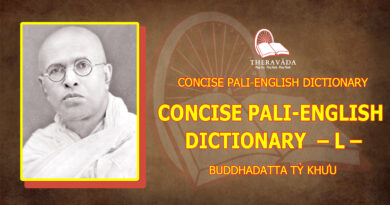A TREATISE ON THE PARAMIS – CHAPTER VII & VIII & IX
A TREATISE ON THE PARAMIS
Chapter VII: What Is Their Defilement?
In general, being misapprehended by craving, etc., is the defilement of all the paramis. Taken separately, discriminating thoughts (vikappa) over gifts and recipients are the defilement of the perfection of giving. Discriminating thoughts over beings and times are the defilement of the perfection of virtue. Discriminating thoughts of delight in sense pleasures and existence, and of discontent with their pacification, are the defilement of the perfection of renunciation.
Discriminating thoughts of “I” and “mine” are the defilement of the perfection of wisdom; discriminating thoughts leaning to listlessness and restlessness, of the perfection of energy; discriminating thoughts of oneself and others, of the perfection of patience; discriminating thoughts of avowing to have seen what was not seen, etc., of the perfection of truthfulness; discriminating thoughts perceiving flaws in the requisites of enlightenment and virtues in their opposites, of the perfection of determination; discriminating thoughts confusing what is harmful with what is beneficial, of the perfection of loving-kindness; and discriminating thoughts over the desirable and undesirable, of the perfection of equanimity.
Thus the defilements should be understood.
CHAPTER VIII: What Is Their Cleansing?
Their cleansing is the removal of the taints of craving, etc., and the absence of the aforementioned discriminations. For the paramis become pure and luminous when untainted by such defilements as craving, conceit, views, anger, malice, denigration, domineering, envy, stinginess, craftiness, hypocrisy; obstinacy, presumption, vanity, and negligence, and when devoid of the discriminating thoughts over gifts and recipients, etc.
Chapter IX – What Are Their Opposites?
In general, all the defilements and all unwholesome qualities are their opposites. Taken separately, stinginess is the opposite of giving, and so on, as mentioned earlier. Further, giving is opposed to greed, hatred, and delusion,, since it applies the qualities of nongreed, non-hatred, and non-delusion to gifts, recipients, and the fruits of giving, respectively. Virtue is opposed to greed, hatred, and delusion, since it removes crookedness and corruption in bodily conduct, etc. Renunciation is opposed to these three corruptions since it avoids indulgence in sense pleasures, the affliction of others, and self-mortification. Wisdom opposes them in so far as greed, etc., create blindness, while knowledge restores sight.
Energy opposes them by arousing the true way free from both listlessness and restlessness. Patience opposes them by accepting the desirable, the undesirable, and emptiness. Truthfulness is their opposite because it proceeds in accordance with fact whether others render help or inflict harm. Determination is the opposite of these three defilements since, after vanquishing the vicissitudes of the world, ‘it remains unshakeable in fulfilling the requisites of enlightenment in the way they have been undertaken. Loving-kindness is the opposite of greed, hatred, and delusion, through its seclusion from the hindrances. And equanimity is their opposite by dispelling attraction and repulsion towards desirable and undesirable objects, respectively, and by proceeding evenly under varying circumstances.









